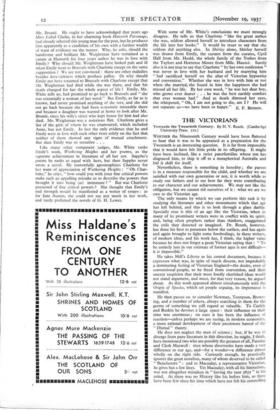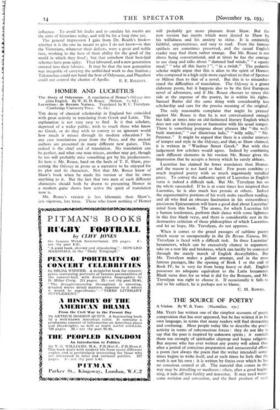THE VICTORIANS
Towards the Twentieth Century. By H. V. Routh. (Cambridge University Press. 2ts.) WHETHER the Nineteenth Century would have been flattered to hear that it was to be appraised as a preparation for the Twentieth is an interesting question. It is far from impossible that it would have felt little pride in its offspring. It might have been inclined, like a strict paterfamilias whose son has disgraced him, to ship it off to a metaphorical Australia and bid it shift for itself.
Nevertheless, there is something in heredity ; the parent is in a measure responsible for the child, and whether we are satisfied with our own generation or not, it is worth while to study our fathers and to see how far they were contributing to our character and our achievements. We may not like the obligation, but we cannot rid ourselves of it : what we are we owe to the Victorian age.
The only means by which we can perform this task is by studying the literature and other monuments which that age has left behind, and this is to look through a glass darkly. Specially true is this of an age like the Victorian, when so many of its prominent writers were in conflict with its spirit, and, being often prophets rather than thinkers, exaggerated the evils they detected or imagined. Dr. Routh, however, has done his best to penetrate below the surface, and has again and again brought to light some forebodings, in these writers, of modern ideas, and his work has, I think, the higher value because he does not forget a great Victorian saying that : " To be entirely just in our estimate of former ages is not difficult— it is impossible."
He takes Mill's Liberty as his central document, because it expresses what was, in spite of much dissent, not improbably a dominating feeling of Victorian England—the desire, even of conventional people, to be freed from convention, and their uneasy suspicion that their most fondly cherished ideas would not stand argument, and must, for that very reason, be argued about. As this work appeared almost simultaneously with the Origin of Species, which set people arguing, its importance is manifest.
He then passes on to consider Newman, Tennyson, Brown- ing, and a number of others, always searching in them for the germs of something we still regard as valuable. To Carlyle and Ruskin he devotes a large space : their influence on their time was enormous ; on ours it has been the influence of reaction—unless perhaps .we are seeing, in modern economics, a more rational development of their passionate hatred of the " Dismal " theory.
He does not neglect the men of science ; but, if he was to diverge from pure literature in this direction, he might, I think, have mentioned two who are possibly the greatest of all, Faraday and Clerk Maxwell : men whose discoveries have made a vast difference to our age, and—for a wonder—a difference almost wholly on the right side. Curiously enough, he practically ignores the great novelists, many of whom deserved to be called " Benefactors " : and to Macaulay, a representative Victorian, he gives but a few lines. Yet Macaulay, with all his limitations, was not altogether mistaken in " having the year 2852 " in his mind. As there was no History like his before him, so there have been few-since his time which have not felt his compelling influence. To avoid his faults and to emulate his merits are the aims of historians today, and will be for .a long time yet.
The general impression I gain from Dr. Routh's book— whether it is the one he meant to give I do not know—is that the Victorians, whatever their defects, were a great and noble race, working to the best of their ability for the good of the world in which they lived ; but that somehow their best-laid schemes have gone agley. They laboured, and a new generation entered into their labours. It may be that the new generation was incapable of carrying the unfinished work to due fruition ; Telemachus could not bend the bow of Odysseus, and Phaethon could not control the chariot of Apollo. E. E. KELLETT.

















































































































 Previous page
Previous page